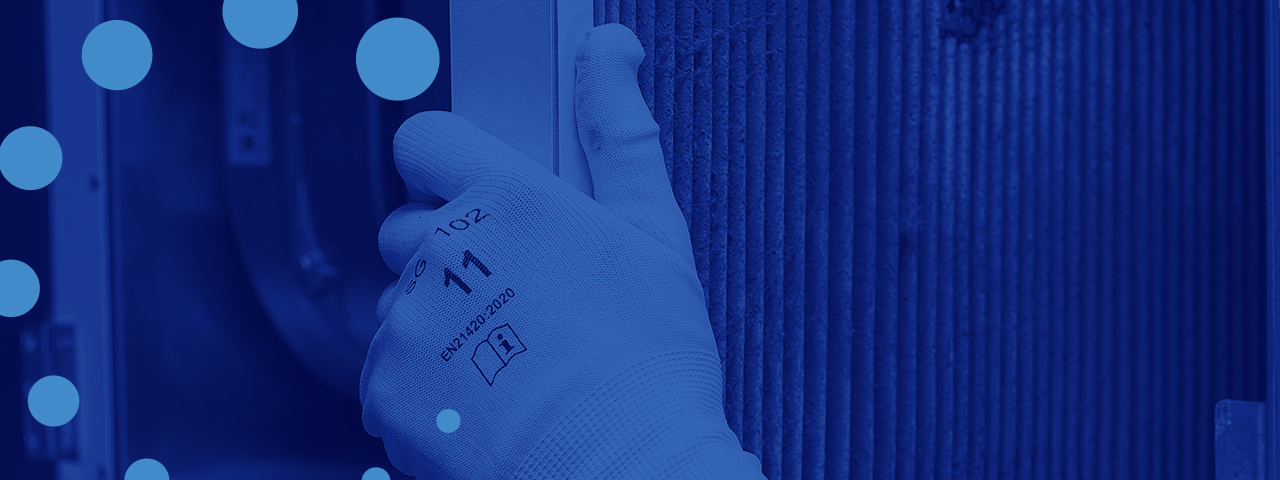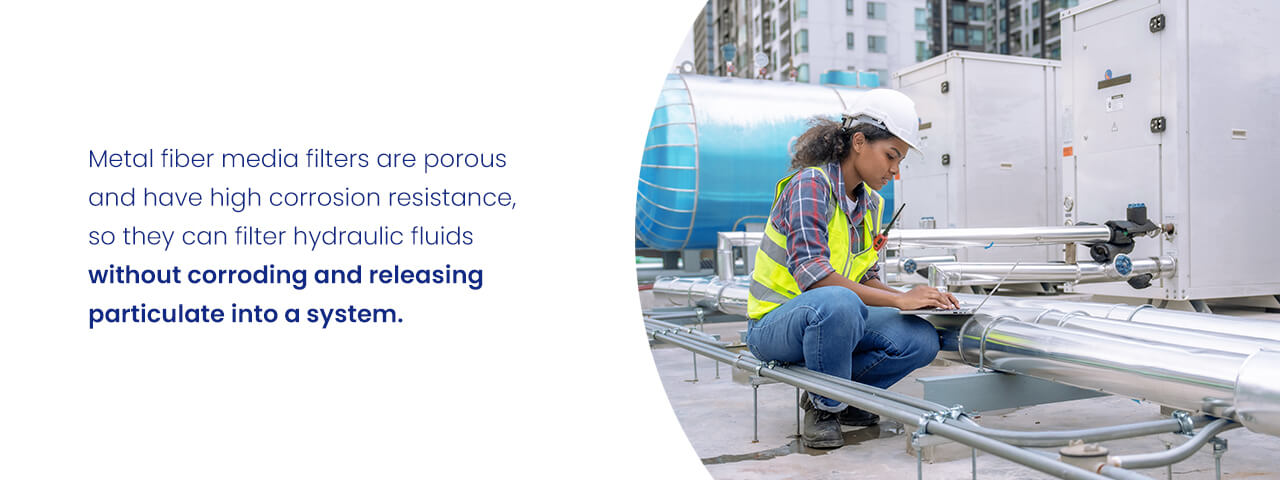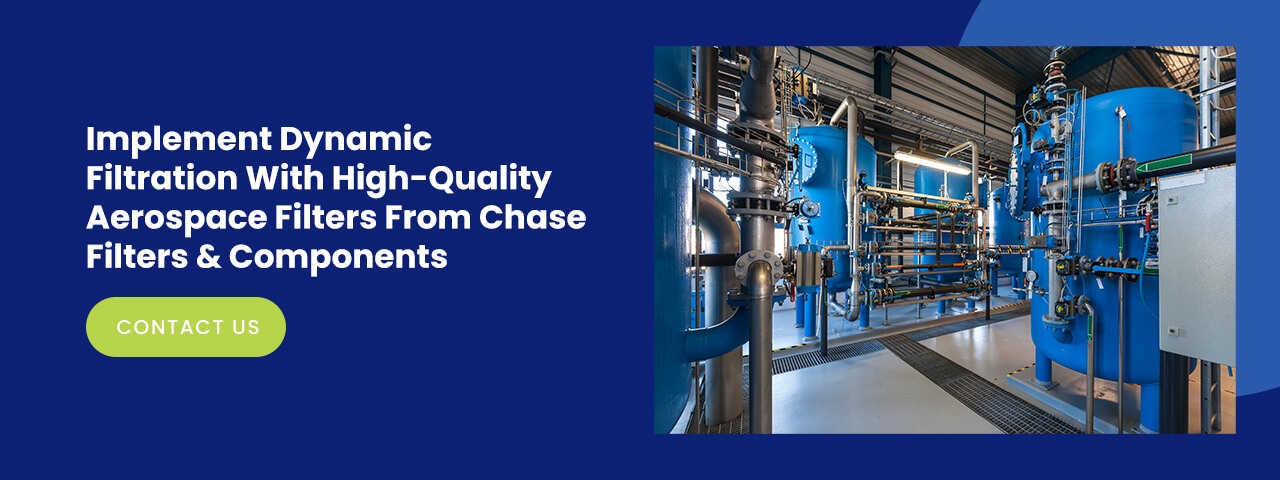May 30, 2024
Guide to Dynamic Filtration
Jump To:
- How Does Dynamic Filtration Work?
- Why Is Dynamic Filtration Important?
- Dynamic Filtration Testing
- Implementing Dynamic Filtration
Dynamic filtration is necessary when there are constant changes in either flow or pressure, along with or constant system vibration. The best filters to use in a dynamic application are fiber metal felt (FMF) elements. Fiber media filters are the best choice to catch and retain particulate matter in dynamic environments.
Dynamic filters remove damaging contaminants that enter hydraulic systems and particulates that these systems produce during operation. The best feature of fiber metal felt elements are their ability to retain contaminants despite the dynamic operating environment.
This process uses metal fiber media filters to catch and retain contaminants from hydraulic fluids and keep hydraulic systems running properly. Dynamic filtration effectively maintains clean fluid under dynamic conditions, such as pressure changes, flow variants, high heat and vibrations.
Space and aircraft vehicles depend on several systems and components to operate effectively, and they function on fuel, oil, gas and oxygen. Dynamic filtration efficiency is crucial in the aerospace industry because it maintains clean hydraulic systems to prevent damage and help vehicles operate safely.
High-quality dynamic filters undergo significant testing to ensure they meet standards. The standard is ISO/CD23369 Cyclic Flow Multi-Pass Test. Dynamic filtration requires capture and retention efficiency to maintain a clean and contaminant-free system. Learn more about what dynamic filtration is and why it matters.
How Does Dynamic Filtration Work?
Dynamic filtration applications use filters that can withstand dynamic flow that occurs during flight. Dynamic flow causes changes in flow, pressure, hydraulic pump pulsations and induced vibration. Metal fiber media filters are porous and have high corrosion resistance, so they can filter hydraulic fluids without corroding and releasing particulate into a system. Dynamic filtration increases aircraft safety and reduces downtime by preventing damage.
Effective dynamic filter performance depends on capture and retention efficiency. Capture efficiency measures how well a filter can capture particulate matter. Retention efficiency determines how effectively a filter retains captured particulates. A filter’s retention efficiency is crucial because a filter can significantly contaminate and damage a system if dynamic conditions cause it to release captured particulates.
Fiber Metal Felt filters effectively catch and retain particulate matter despite flow fluctuations. Traditional micro glass fiber filters cannot deliver effective filtration because they can release particulates back into a system during fluid flow changes. Fiber Metal Felt filters are made of metal fibers, which are thin metal filaments that do not shed particles during filtration. Due to their rigid structure they retain particulate even during these demanding applications.
Fiber Metal Felt filters eliminate the risk of static charges that develop when fluid flows through glass fiber elements. Fiber Metal Felt filters are much stronger than glass fiber filters. They are made of metal fibers fused together, which prevents them from breaking down. High-quality stainless steel fibers are both chemical- and heat-resistant, allowing them to withstand high temperatures and a wide range of fluids.
Why Is Dynamic Filtration Important?
Dynamic filtration is important because it prevents hydraulic systems from failing during flight. Hydraulic systems operate using fluid. A hydraulic system is often the only link connecting an aircraft’s control inputs to its main rotors, making the hydraulic system essential for safe operation.
Hydraulic systems often operate under the following conditions:
- Extreme pressure
- Close internal tolerances
- System-induced heat generated by pumps
- Dynamic forces, constant flow and pressure fluctuations
- Vibration
Hydraulic filters experience rapid flow rate changes when cylinders unload, valves shift or pump output changes. Lube filters can undergo dynamic conditions when aircraft start and shut down.
Contaminants such as water, ingressed particulate matter, sand, o-ring fragments, silt and welding slag can contaminate hydraulic systems, leading to potential flight safety concerns and reduced component life. Hydraulic purification is crucial for ensuring hydraulic systems operate properly and safely.
If a filter fails to capture particulate matter during flight, silting can occur. Silting is when contaminants flow downstream from a filter, and it can cause un-commanded flight control inputs, spool valve locking or increased dynamic component wear. Because particulate sheds from a filter, filter bypass buttons may falsely indicate clean fluid and filter condition.
Dynamic Filtration Testing
The International Organization for Standardization (ISO) is a worldwide organization that sets quality standards that products and components must meet. Filter tests ensure filtration systems meet ISO standards, but further testing ensures filters exceed ISO standards and can perform well in realistic conditions.
The ISO16889 multi-pass test is an industry-standard test for hydraulic filters. This test measures dirt-holding capacity and rates filter efficiency when a filter performs under ideal laboratory conditions. A test circuit circulates hydraulic fluid in a closed-loop system at a consistent flow rate.
Testers add contaminated fluid to the system at a constant rate, and particle counters count particles in small amounts of fluid before and after it enters and exits the filter. Counting the particles in the fluid allows the test system to calculate the filter’s capture efficiency.
A Dynamic Filter Efficiency (DFE) test exceeds ISO testing standards to ensure filters can effectively capture and retain particulates in dynamic conditions. DFE multi-pass testing measures real-time performance and evaluates how effectively a filter can retain contaminants during dynamic changes. It predicts average fluid cleanliness and worst-case fluid cleanliness.
Testers can apply rapid changes during a DFE test and continuously collect and organize data under variable flow conditions to ensure a filter can deliver top performance under hydraulic stress conditions. After the initial test loads the filter element with particulates, a restart test increases the flow from zero to maximum flow in a matter of milliseconds. This restart test replicates a lube or hydraulic system restart.
Rather than evaluating a filter’s capture efficiency under ideal laboratory conditions like an ISO16889 multi-pass test, a DFE multi-pass test measures a filter’s capture and retention efficiency. It induces realistic dynamic conditions to ensure filter effectiveness and safety.
Implement Dynamic Filtration With High-Quality Aerospace Filters From Chase Filters & Components
Dynamic filtration is crucial for safe aircraft operation. The aerospace industry depends on dynamic filtration to keep hydraulic systems clean and working effectively.
Metal fiber media filters capture and retain contaminants as hydraulic fluids flow through systems without shedding particulates, maintaining safe aircraft operation. These filters are porous, heat-resistant and corrosion-resistant. They can catch and retain contaminants effectively without releasing particles back into a hydraulic system.
Using high-quality dynamic filters in spacecraft or aircraft is essential. Only the highest quality filters meet the standards required to perform effectively. While some filters meet ISO standards and can filter properly under ideal laboratory conditions, the best dynamic filters are tested to ensure they can perform effectively in realistic in-flight conditions.
In order to fully protect a hydraulic system and prevent damage, a filter must be able to withstand extreme pressure changes, high temperatures, dynamic forces and corrosive materials. These abilities increase aerospace safety and prevent aircraft downtime.
Chase Filters & Components offers high-quality aerospace filters to help aircraft and spacecraft operate properly and avoid damage. Our hydraulic filters meet filtration efficiency standards to deliver excellent performance. Contact us to learn more or browse our wide selection of filters to equip your aircraft with high-quality dynamic filtration.


